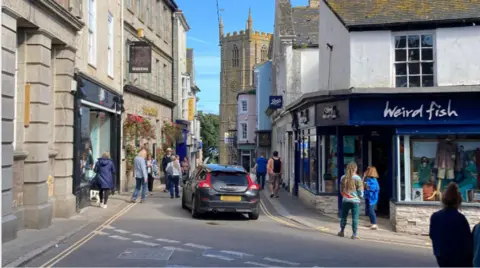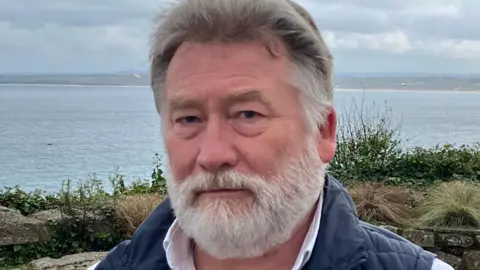St Ives' traffic reduction plan starts
 BBC
BBCThe first phase of a £5.5m scheme to reduce traffic going through a popular Cornish seaside resort has started.
St Ives' low carbon transport project aims to reduce traffic, cut air pollution from car fumes, and encourage more people to cycle, walk, and use public transport.
As part of the first phase, the junction where the Terrace meets Albert Road is being narrowed, to deter motorists, and new paving put down.
Bosses hope the changes will encourage visitors to use car parks further away and not enter the road into the town centre.
The £5.5m scheme is part of nearly £20m St Ives received in its Town Deal as part of the former Conservative government's levelling-up programme.

Andrew Baragwanath, chair of the St Ives Town Board, said: "There are many people with legitimate reasons to drive into the town centre - residents who live there and businesses that need to operate and have deliveries to them at all times of the day.
"It just doesn't work to have blanket heavy restrictions so we are trying to do this with a light touch."
He added previous plans for a one-way system in part of the town centre had been dropped because of the impact on buses and emergency vehicles.
'Essential roadworks'
Civil engineering contractor, Cormac, said three-way temporary traffic lights would be in place at the Terrace junction with some overnight road closures.
Louis Gardner, Cornwall Council's Portfolio Holder for Economy, said: "None of us like roadworks, but it’s a good time of year to get them out the way and they are essential to our work to reduce visitor traffic in the town centre.”
Cormac hoped work would be completed by 13 December - with traffic monitoring cameras to assess the impact of the changes also being installed in the next few weeks.
Other schemes as part of the low carbon transport strategy include signs on the A30 and entrances to St Ives advising drivers on car park availability.
Work improving the junction at Zennor between the B3311 and B3306 is also due to start in January as part of the project.
Follow BBC Cornwall on X, Facebook and Instagram. Send your story ideas to [email protected].
